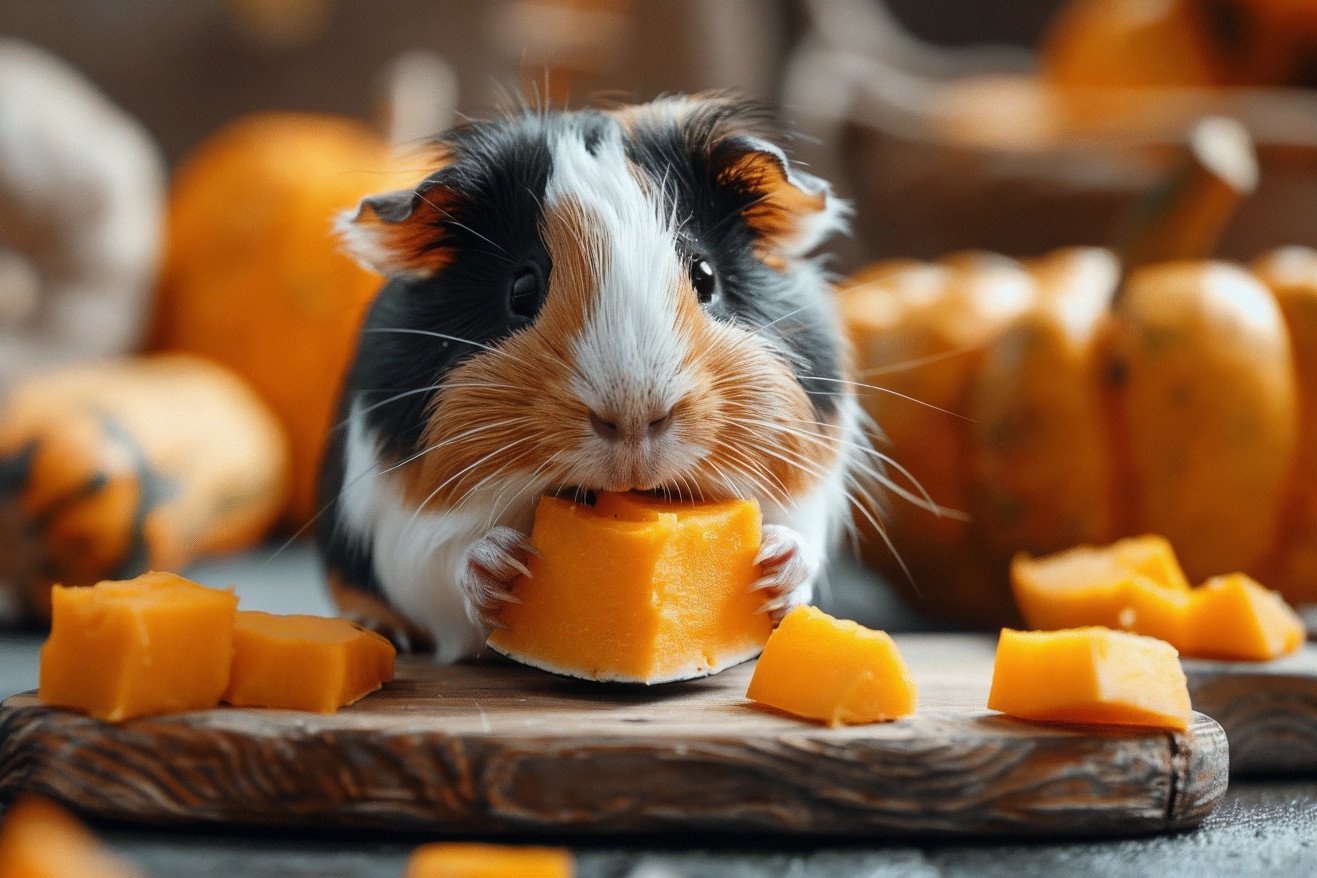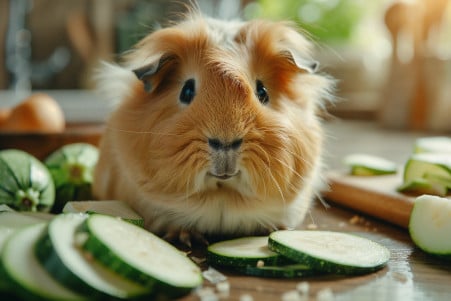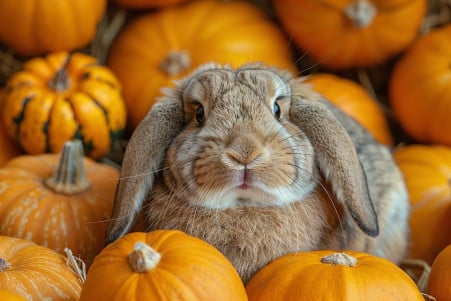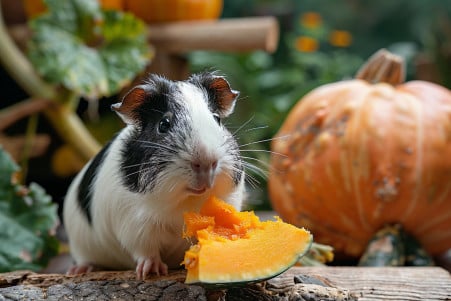Can Guinea Pigs Eat Squash? Nutritional Benefits and Feeding Tips
14 March 2024 • Updated 13 March 2024

Squash is a popular vegetable, but is it a good option for your guinea pig? It turns out that guinea pigs can eat squash, including butternut, zucchini, and pumpkin. It has a lot of vitamins and can even help with hydration.
That said, you should only feed it to your guinea pig a few times a week, make sure it’s free of skin and seeds, and feed it in moderation as part of a well-rounded diet.
In order to give you a complete overview, we have drawn from a variety of studies and papers from veterinary sciences, animal nutrition, and other relevant fields. These references cover the dietary requirements of guinea pigs, the nutritional value of squash for guinea pigs, and the potential benefits and hazards of feeding squash to guinea pigs.
We have also included information on the best ways to incorporate squash into their diet. This will help you better understand what choices to make to ensure your guinea pig’s health.
Can guinea pigs eat squash?
Squash: A Healthy Addition to Your Guinea Pig’s Diet
Guinea pigs can enjoy the many nutritional benefits of squash, a vegetable that is known for its culinary versatility in the human diet. In addition to being a delicious snack, butternut squash, zucchini, and pumpkin are all packed with important vitamins and minerals.
As Hepper explains, butternut squash is high in vitamin A, while zucchini contains vitamin C and phosphorus, which has a good calcium-to-phosphorus ratio that is important for guinea pig health. Meanwhile, pumpkin is low in calories and high in vitamins.
Vitamin C is especially important for guinea pigs since they, like humans, are unable to synthesize it themselves. As a result, HappyCavy points out that guinea pigs can avoid diseases like scurvy if they are fed foods like zucchini that are high in vitamin C. ExoticDirect advises that squash be fed in small amounts and as an occasional treat to avoid health problems, and they stress the importance of a balanced diet.
For an adult guinea pig, the recommended portion size is 100 grams, or about 3.5 ounces, twice a week. This will help ensure that guinea pigs get the nutritional value of squash without overdoing it. By feeding the right amount of squash and other vegetables, guinea pig owners can help their pets stay hydrated, aid their digestion, and support their overall health.
Hydration, Digestion, and Nutrient Balance for Guinea Pigs
Hepper explains that squash does more than just provide guinea pigs with a tasty snack; it helps hydrate them due to its high water content, which can make up a significant portion of their daily water consumption. The fiber in squash helps guinea pigs digest their food and keeps their bowel movements regular.
Plus, the low sugar and fat content in squash helps ensure that guinea pigs get the energy they need without the risk of weight gain.
Maintaining the right calcium-to-phosphorus ratio is important for preventing urinary problems in guinea pigs. Hepper says that squash helps maintain this ratio, which is important for the overall health of guinea pigs. By maintaining a balanced diet that includes squash, guinea pig owners can help prevent these common health problems in guinea pigs.
While adding squash to guinea pig meals is healthy, it’s important to make sure that you’re meeting all of their dietary requirements and that they don’t have any sensitivities by feeding them a variety of vegetables and hay, as the RSPCA suggests.
Mindful Munching: The Dangers of Feeding Squash to Guinea Pigs
Although squash can be a nutritious part of your guinea pig’s diet, it’s important to understand the dangers and limitations of feeding it to your pet. Overconsumption of squash can lead to health problems like obesity and digestive issues because of squash’s high sugar content.
According to Guinea Piggles, butternut squash is high in oxalic acid, which can be toxic to guinea pigs in large quantities and potentially lead to kidney stones or other urinary tract issues.
Allergies to squash are rare in guinea pigs, but if your pet is allergic, it can cause a change in behavior or physical symptoms like skin rashes. Hepper recommends introducing squash into your guinea pig’s diet slowly to watch for any negative side effects and ensure that your pet can eat it safely.
Remember that it’s all about balance; squash should be a supplement to, not a replacement for, the staples of a guinea pig’s diet—hay, pellets, and a variety of vegetables. As long as moderation and caution are used, guinea pigs can have the occasional serving of squash and enjoy its benefits without experiencing its dangers.
Squash in the Spotlight: A Comparison to Other Guinea Pig Vegetables
Squash stands out from other guinea pig vegetables in a few ways. Most notably, squash is a type of vegetable that can be used as a staple. For example, it’s similar to zucchini, which is listed as one of the daily vegetables on the Southern California Guinea Pig Rescue’s list of recommended vegetables due to its vitamin C content.
Unlike treats like raw pumpkin, squash can be used as a staple, ensuring that your pet gets the nutrients they need.
Compared to staples like green leaf lettuce or bell peppers, squash has a unique low-calorie and hydrating profile that can help with your pet’s water intake without leading to a sugar high. A-Z Animals explains that the best vegetables for cavies are those that are high in vitamin C, and squash meets this requirement while also offering a range of flavors and textures that can keep your pet interested in their meals.
It’s important to diversify your guinea pig’s diet with vegetables like squash to make sure that they get a wide range of nutrients. For example, pairing squash with leafy greens can add fiber to your pet’s diet, while an occasional baby carrot or cherry tomato can give them something special.
By combining squash with other approved vegetables in a thoughtful way, GuineaDad explains that pet parents can make a nutritious and delicious vegetable mix that can help ensure a well-rounded approach to mealtime.
How to Feed Squash to Your Guinea Pig
To make sure that squash is a safe and tasty treat for your guinea pig, there are a few things to keep in mind when preparing it. First, make sure you choose a fresh squash and wash it thoroughly under cold water to remove any pesticides or dirt, according to HayPigs.
Then, cut the squash into small, bite-sized pieces that are easy for a guinea pig to chew and swallow, remembering that the size and shape are important to avoid choking hazards. Also, make sure to remove any seeds, which could pose a choking hazard or lead to digestive issues.
Guinea pigs can eat raw squash, and they may actually prefer it to cooked squash. Not only does raw squash have a texture that guinea pigs find more appealing and easier to digest than cooked squash, but it also retains more of its natural vitamins. As a result, serving squash raw will ensure that your pet gets all of the health benefits that the vegetable has to offer, according to wikiHow Pet.
When you first introduce squash or any other new vegetable to your guinea pig, do so slowly. This means starting with a small amount so that your guinea pig’s digestive system can get used to the new food and so that you can watch for any signs of an adverse reaction, such as an upset stomach, according to The Humane Society of the United States.
By doing this, you’ll be able to make sure that your pet continues to get a healthy, balanced diet that includes a variety of different foods that they enjoy.
Final Thoughts: Adding Squash to Your Guinea Pig’s Diet
As we’ve learned, squash can be a great way to add some flavor and nutrition to your guinea pig’s diet, while also providing them with hydration, fiber, and essential vitamins. That said, it’s important to remember that balance and variety are important. Like people, guinea pigs need a balanced diet that includes a mix of vegetables, hay, and pellets, with treats like squash in moderation.
Always be careful when adding squash or any new food to your guinea pig’s diet. Pay attention to your pet for any signs of digestive issues or allergies, and adjust their diet accordingly. This will help ensure that your guinea pig can enjoy the benefits of squash without any negative side effects.
In the end, it’s up to you as a responsible pet owner to make the best decisions for your guinea pig’s health and well-being. You are the one who can make sure that your pet gets the balanced diet that they need. Let’s make sure that we’re always providing our beloved pets with the most nutritious and delicious meals that we can.


